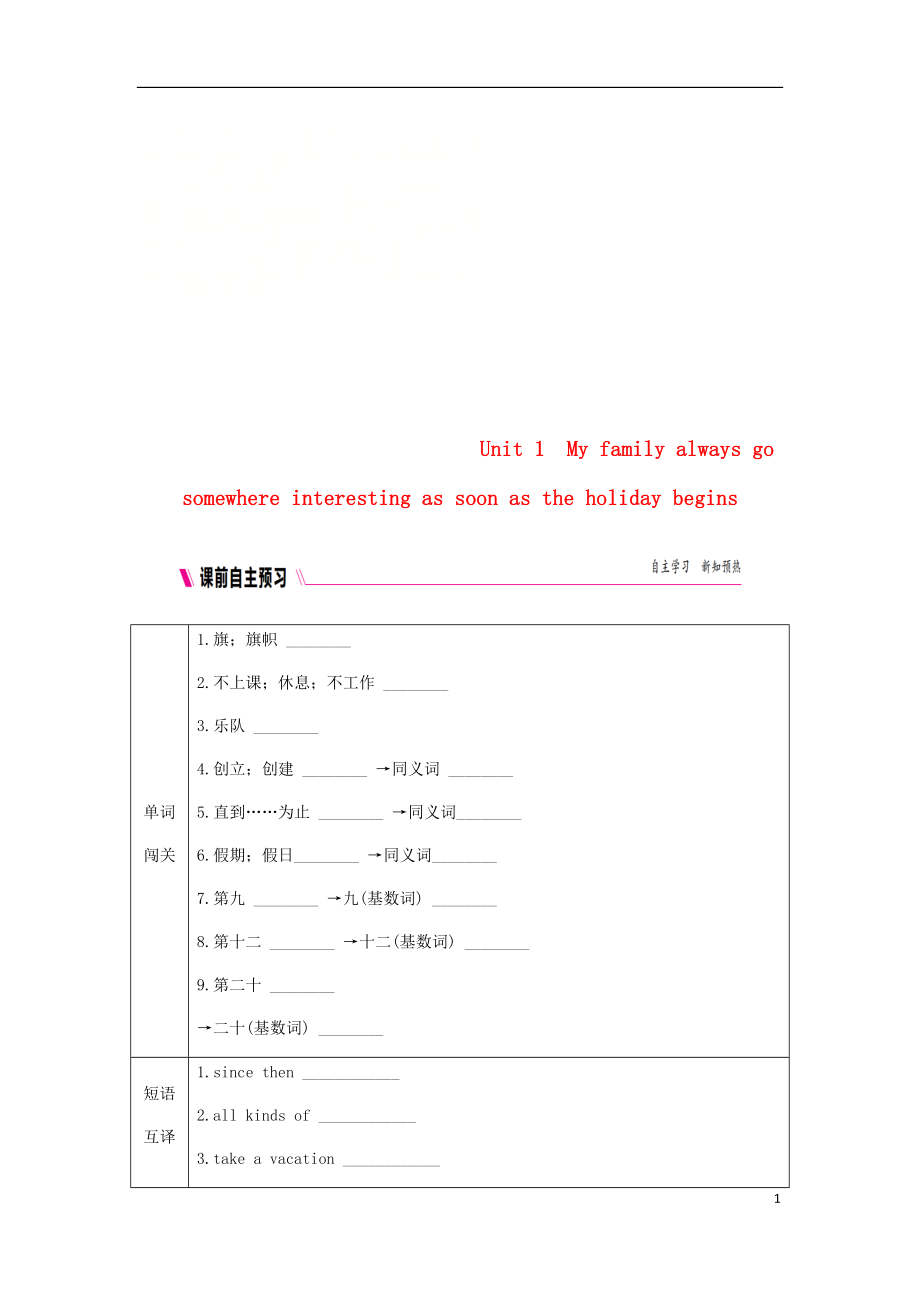《廣西2018年秋九年級(jí)英語(yǔ)上冊(cè) Module 2 Public holidays Unit 1 My family always go somewhere interesting as soon as the holiday begins練習(xí) (新版)外研版》由會(huì)員分享���,可在線閱讀����,更多相關(guān)《廣西2018年秋九年級(jí)英語(yǔ)上冊(cè) Module 2 Public holidays Unit 1 My family always go somewhere interesting as soon as the holiday begins練習(xí) (新版)外研版(8頁(yè)珍藏版)》請(qǐng)?jiān)谘b配圖網(wǎng)上搜索�����。
1�����、
Unit 1 My family always go somewhere interesting as soon as the holiday begins
單詞
闖關(guān)
1.旗�����;旗幟 ________
2.不上課;休息�����;不工作 ________
3.樂(lè)隊(duì) ________
4.創(chuàng)立�;創(chuàng)建 ________ →同義詞 ________
5.直到……為止 ________ →同義詞________
6.假期;假日________ →同義詞________
7.第九 ________ →九(基數(shù)詞) ________
8.第十二 ________ →十二(基數(shù)詞) _
2�、_______
9.第二十 ________
→二十(基數(shù)詞) ________
短語(yǔ)
互譯
1.since then ____________
2.all kinds of ____________
3.take a vacation ____________
4.have one day off ____________
5.玩得高興;有樂(lè)趣 ____________
6.一……就…… ____________
7.舉行野餐 ____________
8.三天的假期 ____________
連詞成句
1.isn't, Lingling, China's
3�、 National Day, is, the First of October, it(玲玲,10月1日是中國(guó)的國(guó)慶節(jié)��,不是嗎�?)
________________________________________________________________________
________________________________________________________________________
2.the end of, until, stay, the, we'll, holiday, there(我們會(huì)一直待在那兒,直到假期結(jié)束��。)
___________
4����、_____________________________________________________________
________________________________________________________________________
3.but, a, we, only, it's, one day off, have, public holiday (它是一個(gè)公共假期,但我們只放一天假�。)
________________________________________________________________________
_______
5�、_________________________________________________________________
4.as soon as, go, holiday, my family, begins, somewhere interesting, the, always(假期一開(kāi)始,我的家人總會(huì)去某個(gè)好玩的地方�。)
________________________________________________________________________
______________________________________________________
6�����、__________________
1 until prep.直到……為止 conj.直到……為止
[觀察] …we'll stay there until the end of the holiday.
……我們會(huì)一直待在那兒���,直到假期結(jié)束。
I didn't wake up until 11 o'clock.
我直到11點(diǎn)才醒來(lái)�。
[探究]
[圖解助記](méi)
活學(xué)活用
1.2017·東營(yíng)—A little monkey might feel sad because of having a new baby sister or brother!
7、
—Yeah. I didn't know that ________ I saw the film Born in China.
A. if B. until
C. since D. although
2 as soon as 一……就……
[觀察] And my family always go somewhere interesting as soon as the holiday begins. 并且假期一開(kāi)始��,我的家人總會(huì)去某個(gè)好玩的地方�����。
[探究] as soon as意為“____________”����,引導(dǎo)時(shí)間狀語(yǔ)從句,如果主句用一般將來(lái)時(shí)或祈使句�,as s
8、oon as引導(dǎo)的從句必須用____________表示將來(lái)���。
活學(xué)活用
2.2017·襄陽(yáng)—Can you tell me when you are going to arrive there?
—I'm not sure. But I'll ring you up as soon as I ________ there tomorrow.
A. arrive
B. arrived
C. will arrive
D. am going to arrive
1 The First of October is China's National Day, isn't it,
9����、Lingling?
玲玲,10月1日是中國(guó)的國(guó)慶節(jié)����,不是嗎?
[探究] 本句是反意疑問(wèn)句�,由“陳述句+附加疑問(wèn)部分”構(gòu)成,附加疑問(wèn)部分的人稱和時(shí)態(tài)與陳述句保持一致����,前后兩部分遵循“前 ________ 后 ________;前 ________ 后 ________”原則�。
結(jié)構(gòu)
陳述部分肯定式+疑問(wèn)部分否定式
She was ill yesterday, wasn't she?
她昨天生病了,不是嗎�����?
陳述部分否定式+疑問(wèn)部分肯定式
You didn't go, did you?
你沒(méi)去���,是嗎��?
答語(yǔ)
事實(shí)是肯定的��,就用 ________����,后跟肯定的簡(jiǎn)略句��;事實(shí)是否
10����、定的,就用 ________�����,后跟否定的簡(jiǎn)略句��。
—His sister didn't attend the meeting, did she?
他妹妹沒(méi)有參加會(huì)議���,是嗎�?
—Yes, she did./No, she didn't.
不���,她參加了���。/是的,她沒(méi)參加����。
[拓展] 陳述部分含有never, few, little, nothing, nobody, no, none, hardly, too…to…等表示否定意義的詞時(shí)�����,其附加疑問(wèn)部分應(yīng)用 ________ 形式�。
There are few people in the room, are there�?房間里幾乎沒(méi)有人
11、�����,是嗎���?
活學(xué)活用
1. 2017·黔南州—Summy ate nothing for breakfast this morning, ________�����?
—No, because she had a stomachache.
A. isn't she
B. was she
C. didn't she
D. did she
2 People have celebrated the National Day since then.
從那時(shí)起��,人們就開(kāi)始慶祝國(guó)慶節(jié)了�����。
[探究] (1)since作介詞�,意為“自……以來(lái)”,后接表示過(guò)去的時(shí)間點(diǎn)��。該句的結(jié)構(gòu)為“現(xiàn)在完成時(shí)+
12���、since+時(shí)間點(diǎn)”。
(2)since還可作連詞����,后接表示過(guò)去的時(shí)間狀語(yǔ)從句,常見(jiàn)的結(jié)構(gòu):
①It's+時(shí)間段+since+句子(一般過(guò)去時(shí)).
=It has been +時(shí)間段+since +句子(一般過(guò)去時(shí)).
It's ten years since he left Hefei.
=It has been ten years since he left Hefei.
自從他離開(kāi)合肥已經(jīng)10年了���。
②主句(現(xiàn)在完成時(shí))+since+句子(一般過(guò)去時(shí)).
I have lived here since I was born. 我自從一出生就住在這里�����。
活學(xué)活用
2.2
13��、016·海南 Uncle Liang ________ in Haikou since 1980, so he knows a lot about the city.
A.is living B.has lived
C.lived
詳解詳析
【課前自主預(yù)習(xí)】
單詞闖關(guān)
1. flag 2. off 3. band 4.found; build
5.until; till 6.vacation; holiday
7.ninth; nine 8.twelfth; twelve
9.twentieth; twenty
短語(yǔ)互譯
1.從那以后 2.各種各樣的 3.去
14�����、度假
4.休一天假 5.have fun 6.as soon as
7.have a picnic 8.a three-day holiday
連詞成句
1. The First of October is China's National Day, isn't it, Lingling?
2. We'll stay there until the end of the holiday.
3. It's a public holiday, but we only have one day off.
4. My family always go somewhere interest
15�、ing as soon as the holiday begins.
【課堂互動(dòng)探究】
詞匯點(diǎn)睛
1 肯定�����; 否定; 時(shí)間狀語(yǔ)
B 考查連詞辨析����。if意為“如果”;until意為“直到”����;since意為“自從”;although意為“盡管”��。not…until…為固定結(jié)構(gòu)����,意為“直到……才……”。句意:“一只小猴子可能會(huì)因?yàn)橛辛诵∶妹没虻艿芏械絺?��?��!薄笆堑摹N抑钡娇戳穗娪啊段覀冋Q生在中國(guó)》才知道��?!惫蔬xB�����。
2 一……就……���; 一般現(xiàn)在時(shí)
A 考查動(dòng)詞的時(shí)態(tài)。as soon as意為“一……就……”����,遵循“主將從現(xiàn)”原則�,所以as soon as引導(dǎo)的從句應(yīng)該用一般現(xiàn)在時(shí)。故選A����。
句型透視
1 肯; 否���; 否����; 肯�; Yes; No; 肯定
D 考查反意疑問(wèn)句。反意疑問(wèn)句遵循“前肯后否�,前否后肯”原則��,由句中nothing知�����,這個(gè)陳述句為否定句�,后面的問(wèn)句要用肯定句���,排除A�����、C����;前一句中的謂語(yǔ)動(dòng)詞是ate���,因此后面的問(wèn)句用did幫助提問(wèn)��,排除B���。故選D。
2 B
8
 廣西2018年秋九年級(jí)英語(yǔ)上冊(cè) Module 2 Public holidays Unit 1 My family always go somewhere interesting as soon as the holiday begins練習(xí) (新版)外研版
廣西2018年秋九年級(jí)英語(yǔ)上冊(cè) Module 2 Public holidays Unit 1 My family always go somewhere interesting as soon as the holiday begins練習(xí) (新版)外研版

